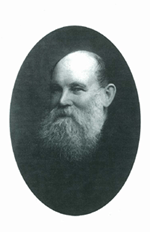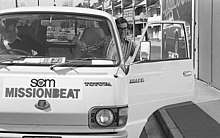Mission Australia
Mission Australia is a national Christian charity that provides a range of community services throughout Australia. In 2017–18, Mission Australia employed approximately 2800 staff and 1750 volunteers, and supported more than 119,000 children, young people, adults and elderly people across 461 programs and services.[1] The organisation specialises in the areas of homelessness and housing, families and children, early learning, youth, employment and skills, alcohol and other drugs, disability, mental health, and strengthening communities. James Toomey became CEO in November 2017, succeeding Catherine Yeomans, who served as CEO from March 2014.[2]
History
Mission Australia traces its origins back to 1859 to the Brisbane Town and Country Mission, which operated at a grassroots level to respond to need within the community. At this time in Australian history the needs were great, with many people struggling to stay fed, clothed and housed. [3]
On 11 July 1862, Englishman Benjamin Short established the Sydney City Mission, desiring to address the spiritual and physical needs of the city’s inhabitants who were living in poverty.
In a public meeting, Short presented his vision for Sydney City Mission:
“Christian friends, we have called you together because we desire to submit for your serious consideration the question, ‘Is it not desirable that there be established in Sydney a City Mission, somewhat similar in character to the London City Mission?’ … We feel that something must be done, and that the Christian Churches of Sydney cannot be held guiltless if they neglect to stretch out a helping hand to rescue those who are perishing around them.” [4]

Short gained the support of many prominent citizens, including the likes of John Fairfax, and clergymen of almost every denomination. The motto ‘Need, Not Creed’ emerged, with those present agreeing that a city as diverse as Sydney required a non-denominational City Mission.
Four missionaries were appointed in 1862 (two men and two women), with their main tasks including home visits, distributing Bibles, persuading alcoholics to turn sober, and encouraging parents to send their children to school and Sunday School.[5]
Adelaide City Mission followed soon after in 1867 with a similar goal of addressing spiritual and physical need among the poor and disadvantaged in the city.
For decades these and other missions met immediate needs, giving out food and clothing. As no government welfare or unemployment benefits existed, City Missions saved many families from starvation.
During the recession of 1890 and the Great Depression of the 1930s, Mission halls overflowed with people in need. By the middle of the 20th century, the City Missions recognised the importance of finding long-term solutions to disadvantage.
In 1974 Perth City Mission, then known as Jesus People Welfare Services, was founded.[6]
In 1989 Wollongong City Mission and Wagga Wagga City Mission were founded.
In 1991, Hunter Mission was established, building on community service programs provided by Mayfield Baptist Church.[7]
In 1996, Mission Australia officially formed, bringing together Adelaide City Mission, Hunter Mission, Perth City Mission, Sydney City Mission, Wagga Wagga City Mission and Wollongong City Mission. Brisbane City Mission joined soon after in 1998.
In 2000, Mission Australia’s Northern Territory and Tasmania state offices opened, followed by Victoria in 2002.
In 2008, Mission Australia Housing was established, and was joined the following year by Mission Australia Early Learning.
The following lists names of organisations that have merged and amalgamated over time to form Mission Australia:
- Adelaide City Mission, later known as Mission SA
- Canberra City Mission
- Hunter Mission
- Jesus People Welfare Services, later known as Perth City Mission
- Mission Australia Group Training and Mission Employment
- Mission Australia Limited
- Mission Australia Southern NSW
- NSW Country Services
- Sydney City Mission
- Town and Country Mission, later known as Brisbane City Mission
- Wagga Wagga City Mission
- Wollongong City Mission
Goal, purpose and values
Mission Australia has an organisational goal: To reduce homelessness and strengthen communities across Australia.
Its purpose – the guiding principle upon which the Mission was founded – is stated as: Inspired by Jesus Christ, Mission Australia exists to meet human need and to spread the knowledge of the love of God.
Mission Australia lists its core values as Compassion, Integrity, Respect, Perseverance and Celebration.[3]
Services
Mission Australia's integrated nationwide services aim to help people find safe and affordable housing, support disadvantaged children and families, empower troubled young people, assist people with mental illness and disability, and more.
Homelessness and housing

Mission Australia offers specialist support services that enable people to avoid and escape homelessness. It provides crisis and transitional accommodation, as well as social and affordable housing. In 2017-18, Mission Australia assisted 16,846 people through 62 homelessness services.[1]
In 1979, Sydney City Mission launched the Missionbeat homelessness outreach service. Missionbeat vans patrolled the city streets offering support to homeless and intoxicated individuals.[8] The Missionbeat Sydney service continues today, with a primary focus on supporting long-term rough sleepers. Youthbeat services, which offer support to vulnerable young people on the street, operate in Tasmania and Perth, and Mission Australia has plans to launch another mobile outreach service targeting young people in the Northern Territory.
In 2008, Mission Australia established Mission Australia Housing, a Tier 1 community housing provider. Mission Australia Housing currently owns or manages more than 1900 social and affordable homes across NSW, Queensland, Tasmania and Victoria, and houses more than 3500 residents.[1]
Families and children
Mission Australia provides extensive support for families and children, including high quality early learning services. Its programs and services aim to create stable, nurturing environments for children, families and communities to thrive. In 2017-18, Mission Australia assisted 23,334 people through 70 families and children services, and cared for more than 6000 children across 46 Early Learning Centres.[1]
Youth
Mission Australia offers a diverse range of services to help young people engage positively with family, community, education and employment. It seeks to listen to and empower young people to lead positive change in their lives and in society. In 2017-18, Mission Australia assisted 8775 young people through 25 youth-specific services.[1]
Strengthening communities
Mission Australia provides a network of place-based community development and early intervention and prevention programs tailored to meet the needs of local communities. These programs seek to listen to individuals and equip them to transform their communities. In 2017-18, Mission Australia assisted 13,094 people through 24 strengthening communities services.[1]
Employment and skills
Mission Australia helps people of all ages who have experienced barriers to employment to gain the skills and confidence to find and keep a job. It offers a variety of service models including Disability Employment Services, Transition to Work, ParentsNext and social enterprises. In 2017-18, Mission Australia assisted 11,998 people through 76 employment and skills services.[1]
Registered Training Organisation
Since its initial involvement with vocational training in the mid 1970s, Mission Australia has played a major role in providing training and education programs in a wide range of learning environments.
Mission Australia’s Registered Training Organisation (RTO ID 6966) is registered with the national regulator ASQA.
The RTO has undergone many changes over time, and today focuses predominantly on the provision of accredited training for individuals who wish to gain the knowledge and skills relative to career planning and learning pathways.
Alcohol and other drugs
Mission Australia offers holistic support to people affected by alcohol and drug issues. Programs and services support individuals to overcome dependency, and seek to address the underlying factors that led to their addiction. In 2017-18, Mission Australia assisted 9150 people though 26 alcohol and other drug services.[1]
Mental health
Mission Australia provides individual, targeted and flexible care for people with mental health issues to help them overcome the challenges they face and achieve their goals. In 2017-18, Mission Australia assisted 10,149 people through 52 mental health services.[1]
Disability
Mission Australia is an NDIS Partner in the Community in various locations in New South Wales, Queensland, South Australia, Tasmania and Western Australia. It delivers Early Childhood Early Intervention (ECEI) and Local Area Coordination (LAC) services, helping people with disability get the supports they need and supporting their inclusion in their community. In 2017-18, Mission Australia assisted 4,160 people through 27 disability services.[1]
Other services
Other areas of Mission Australia’s work in addition to those listed above include support for people affected by domestic and family violence, people requiring financial support, and people linked to the justice and corrections system. In 2017-18, Mission Australia supported 12,233 people through 48 domestic and family violence, financial support, and justice and corrections services.[1]
Research, impact measurement, policy and advocacy
Mission Australia works to influence public policy relating to homelessness and disadvantage and raise awareness and support of key social issues.
Research
Mission Australia undertakes research and produces publications on the key issues affecting its services and the people who access them. Its research findings also contribute to discussions about key and emerging issues with government, in the media, and within the community services sector, academia, business and the community.
Youth Survey
Mission Australia’s annual Youth Survey is Australia’s largest annual survey of young people of its kind. A record 28,286 young people aged 15-19 participated in the 2018 Youth Survey, and identified mental health, alcohol and drugs, and equity and discrimination as the three most important issues in Australia today. For the first time in the survey’s 17-year history, young people identified mental health as the top issue in every state and territory across the country.[1]
Impact measurement
Mission Australia claims to be a national leader among Australian welfare organisations in the area of impact measurement.[1] Impact measurement is a framework that helps to evaluate client outcomes for the purpose of maximising the effectiveness of services and continuously improving their impact for clients. As of March 2019, Mission Australia had 235 service sites participating in impact measurement.
Policy and advocacy
Mission Australia seeks to influence policy decisions through submissions and reports that draw on evidence, the expertise of its staff, and the experiences of the people who access its services. Mission Australia has a long history of working with government at all levels, as both a service provider and influencer.
Reconciliation Action Plan
Mission Australia launched its first Reconciliation Action Plan (RAP) in 2009. Its second RAP, the current Innovate Reconciliation Action Plan, launched in August 2017. The current RAP provides the framework for Mission Australia’s reconciliation journey through to June 2019 and has been endorsed by Reconciliation Australia. The RAP is an agreed strategy on how the organisation intends to contribute to reducing the gap in living standards between Aboriginal and Torres Strait Islander and non-Aboriginal and Torres Strait Islander Australians.[9]
Funding
Mission Australia is a registered charity with the Australian Charities and Not-for-profits Commission.[10]
The organisation receives income from federal, state and local governments, rent, fees and fundraising. In 2017-18, Mission Australia invested 90.3% of its income back into its programs and services.[1]
Notes
References
- "Mission Australia releases Annual Report 2018". www.missionaustralia.com.au. Retrieved 27 March 2018.
- "Mission Australia CEO Announcement – Statement From Chairman Ken .Dean". www.missionaustralia.com.au. Retrieved 27 March 2018.
- "About Mission Australia". www.missionaustralia.com.au. Retrieved 28 June 2019.
- "The Sydney Morning Herald". The Sydney Morning Herald. 12 July 1862. p. 7.
- Short, Wilsie. Benjamin Short 1833-1912: A Migrant with a Mission. University New South Wales Press, Sydney. pp. 32–35.
- ""Jesus People Welfare Incorporated"". Retrieved 7 December 2018.
- Chambers, Charles. Coming Together. Mission Australia. pp. 119–120.
- Chambers, Charles. Coming Together. Mission Australia. pp. 55–60.
- "Reconciliation Action Plan (RAP) | Mission Australia". www.missionaustralia.com.au. Retrieved 28 June 2019.
- acnc_charity_api_user (13 June 2019). "Mission Australia". www.acnc.gov.au. Retrieved 28 June 2019.